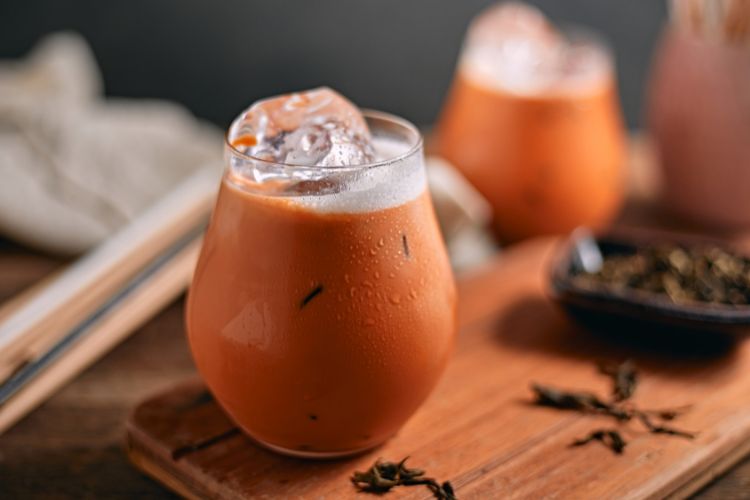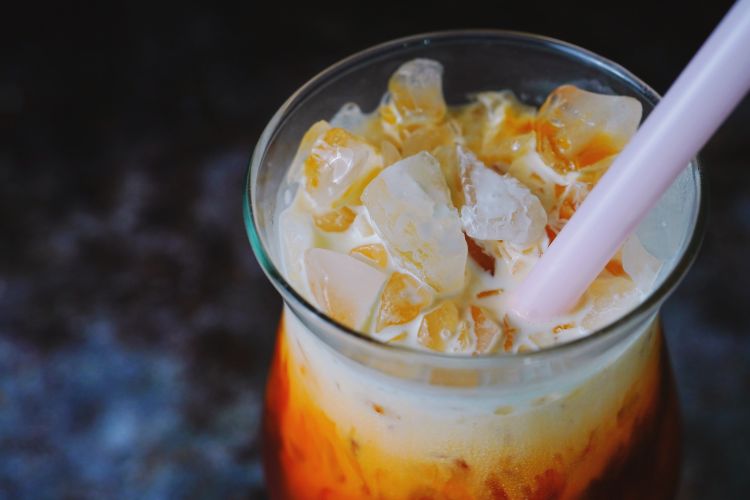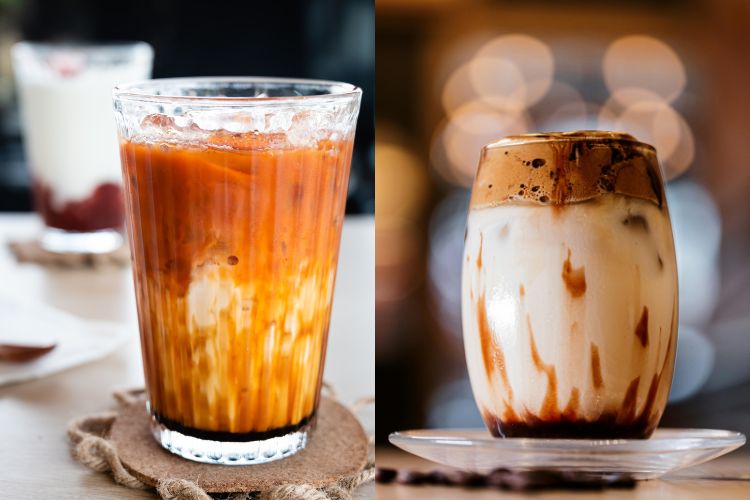Thai Iced Tea vs Coffee: Which Gives a Better Kick?
Looking for a powerful caffeine kick? Thai iced tea stands out with its creamy taste, sweet finish, and signature orange coloring. But Coffee? It needs no introduction.
Both drinks bring bold flavor—but they don’t serve the same purpose.
Some days, you want something rich and refreshing over ice. Other days, you need a caffeine hit that cuts straight through. That’s where the comparison gets interesting.
The Thai iced tea vs coffee debate isn’t just about caffeine—it’s about how each drink fits into your routine, your mood, and your taste.
What Makes Thai Iced Tea Unique
In Thailand, they call it Cha Yen—but most people know it as Thai iced tea. You’ll spot it instantly: a bright orange layer, creamy swirls, and a cold pour that hits different on a warm afternoon.

It starts with strong black tea, then comes the rich condensed milk, a touch of sugar, and a bold mix of spices like cardamom, star anise, and cinnamon.
It’s brewed, cooled, and poured into a tall glass packed with ice. Sometimes, you’ll find it topped with boba pearls, a slice of lime, or even a few mint leaves.
It’s not just the flavor—it’s the full presentation. The drink looks layered, feels silky, and has a lingering sweetness. That’s why it’s a staple in street food stalls and a steady favorite in Thai cuisine.
Caffeine Showdown: Thai Iced Tea vs Coffee
An 8-ounce serving of Thai iced tea usually contains around 30 to 60mg of caffeine, depending on the brewing method and how much milk or ice is in the final mixture.
It’s enough to lift your mood, but not enough to spike your system.
Coffee, on the other hand, comes in stronger, averaging 80 to 100mg of caffeine for the same amount. That’s around double the caffeine content, which makes a difference if you’re trying to stay sharp or get through a long day.
The effect?
- Thai tea feels slower, smoother, and easier on the body.
- Coffee brings faster alertness and stronger focus, but it’s also where restlessness, jitters, or anxiety might creep in—especially with repeated cups.
Both are fine in moderation. The better choice comes down to what your tolerance looks like and when you’re reaching for your next drink.

When to Drink What: Thai Iced Tea vs Coffee
Some drinks are about comfort. Others are about performance. If you’re deciding between Thai iced tea and coffee, it helps to think about more than just taste. Your timing, energy level, and even your next meal can all point you in the right direction.
When Thai Iced Tea Makes Sense
If you’re craving something cool on a hot day, this is the one. Thai iced tea brings a rich, creamy finish, served over ice with layers of sweetness and spice. It’s a win with bold dishes in Thai cuisine, and it fits right in as a dessert or late lunch companion.
It’s also a solid pick for anyone who wants to lift their mood without chasing a full caffeine boost. The lower stimulant load means fewer jitters and a smoother energy curve—especially helpful if you’re prone to anxiety.
Prefer something you can sip slowly? This one’s for the dessert lovers. It holds up as a post-meal treat without adding another dessert course.
Pro tip: Try swapping in coconut milk or cutting the sugar for a lighter version that still satisfies.
When Coffee Does the Job
When focus matters—early meetings, late work sessions, or getting through a long list—coffee makes a real difference.
The higher caffeine content kicks in fast, making it ideal when you need quick alertness and long-lasting energy.
You can also shape the experience with your brewing method. Cold brew is smoother, while a French press pulls a deeper, bolder flavor.
If you’re caffeine-sensitive, keep an eye on timing. Choose in moderation, especially if you’re drinking later in the day or managing sleep or blood pressure concerns.
Pro tip: Keep a decaf or light roast on hand when you want the routine without the spike.
Boba, Spices, and Twists: Make Thai Iced Tea Your Own
If you’ve tried Thai iced tea once and felt unsure, it might not be the tea—it might be the version you had. Like coffee, this drink changes dramatically depending on the ingredients, presentation, and the extras on top.
Here are a few simple upgrades that can shift the whole experience:
- Add texture: Drop in boba pearls, roasted sesame, or soybean seeds for a layered sip with every straw pull.
- Play with flavor: Stir in a dash of almond extract, a ribbon of chocolate, or a hint of tamarind for a sweet-sour note.
- Brighten it up: A few mint leaves or a slice of lime add freshness that cuts through the sweetness.
- Make it a dessert: Pour over coconut milk ice cream for a Thai tea float, or blend it into a slushy for a bold cold drink.
- Top it off: Try a whipped cream layer or drizzle in flavored syrups.
It’s a flexible drink with room to experiment. Start with a solid base, then shape it to match your taste. One small tweak can turn a maybe into a must!
The Final Scoop
Some days call for intensity. Others call for comfort. When comparing Thai iced tea caffeine vs coffee, the difference is clear—especially in how each drink lands in the body.
Coffee brings a fast caffeine boost, a sharp edge, and bold character. It’s built for early hours, focused work, and no-nonsense routines. The typical coffee mixture is simple but effective. When you need power, it’s ready.
Thai iced tea, on the other hand, leans into creamy taste, textured presentation, and mellow energy. Its flavor profile feels indulgent, but the lower caffeine content keeps things steady.
It’s a smart choice when you’re easing into your day or winding down after a meal.
These drinks share similarities—milk, taste, ritual—but they play different roles. The best pick depends on timing, mood, and what you’re in the mood to feel.


